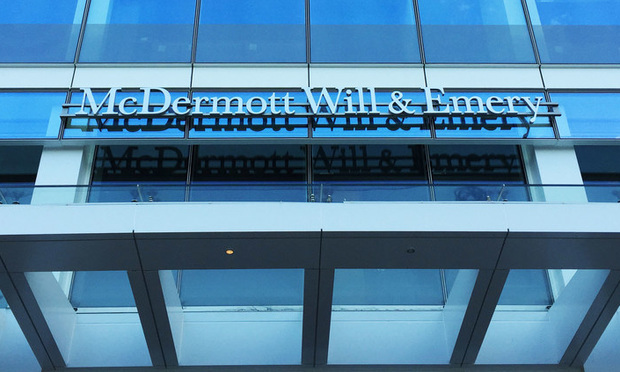A Mayer Brown Supreme Court Duo Leaps to McDermott
Until now, with the arrival of Michael Kimberly and Paul Hughes, McDermott Will & Emery has not had a Supreme Court practice as such.
June 03, 2019 at 08:00 AM
4 minute read
 McDermott Will & Emery's Washington, D.C., offices. Credit: Diego M. Radzinschi / NLJ
McDermott Will & Emery's Washington, D.C., offices. Credit: Diego M. Radzinschi / NLJ
Michael Kimberly and Paul Hughes first met 13 years ago at the Yale Law School Supreme Court Advocacy Clinic. They were hired by Mayer Brown on the same day in 2009 and became partners at the firm in 2015.
Today, they are jumping together to join McDermott Will & Emery. It's a blow for Mayer Brown and a coup for McDermott as it grows a Supreme Court and appellate practice with two young up-and-comers.
McDermott invited the duo to join the firm and lead the practice in Washington, and Kimberly and Hughes wouldn't have wanted it any other way.
“We've practiced law, effectively now, for 13 years together and I couldn't imagine having a better partner or practicing law without Michael,” said Hughes, 36, in an interview with NLJ.
Kimberly, 38, said: “As we were both contemplating a transition away from Mayer Brown, we both early on made the commitment to do it together.”
Ira Coleman, chairman of McDermott, said in a statement, “Paul and Michael don't just deliver, they invest deeply in every case and work passionately in pursuit of their clients' objectives. Our new colleagues are among the most elite appellate advocates in the country today, and we're proud they have chosen McDermott as their new home.”
Both Hughes and Kimberly have five Supreme Court arguments under their belts, as well as more than 200 appellate matters each in federal and state courts.
In March when Hughes prepared to argue in the high-profile regulatory case Kisor v. Wilkie, and Kimberly prepared for the gerrymander case Lamone v. Benisek, they served as “second chair” for each other. At the time, Kimberly said in an interview with NLJ that “we could have swapped” and argued each other's cases.
The two are still awaiting decisions in those cases as well as Manhattan Community Access v. Halleck, a “state actor” dispute. Last week, Kimberly won a unanimous decision in another case he argued: Smith v. Berryhill, which involved Social Security.
And they already have a case lined up for the court's next term: Kansas v. Garcia, an immigration dispute in which they represent three individuals convicted on state charges of identity theft for using the Social Security numbers of others.
“We very much plan to hit the ground running with one Supreme Court argument in the fall, and we hope more to follow,” Hughes said.
Hughes and Kimberly praised Mayer Brown and said it was difficult to leave behind the “great professional collaborators” of the firm.
Until now, McDermott has not had a Supreme Court practice as such, although partner M. Miller Baker has worked on Supreme Court cases as co-chairman of its appellate practice group. Baker's nomination to become a judge on the U.S. Court of International Trade is pending before the Senate. Baker reported earning $587,000 at McDermott in 2017, and $557,000 in 2016, according to a financial disclosure that was submitted as part of the confirmation process.
Hughes said he envisions “a robust appellate practice that touches on a variety of areas, including civil rights, immigration work, criminal defense, as well as a full panoply of business cases affecting the interests of our clients.”
The duo will continue as co-directors of the Yale Supreme Court clinic, along with Mayer Brown partners Andrew Pincus and Charles Rothfeld, and former New York Times Supreme Court correspondent Linda Greenhouse, a senior research scholar at Yale.
Asked about Hughes and Kimberly, Greenhouse said, “Teaching with Paul and Michael these past eight or nine years, it's been a thrill watching them both come into their own as major Supreme Court players.”
Read more:
Shanmugam Exits Williams & Connolly to Launch Paul Weiss Appeals Practice
Lisa Blatt Rejoins Williams & Connolly, This Time as Supreme Court Practice Head
Roberts Straddles the Middle as Gorsuch Questions Federal Regulatory Power
Don't Overturn Key Regulatory Rulings, US Solicitor Tells Supreme Court
This content has been archived. It is available through our partners, LexisNexis® and Bloomberg Law.
To view this content, please continue to their sites.
Not a Lexis Subscriber?
Subscribe Now
Not a Bloomberg Law Subscriber?
Subscribe Now
NOT FOR REPRINT
© 2025 ALM Global, LLC, All Rights Reserved. Request academic re-use from www.copyright.com. All other uses, submit a request to [email protected]. For more information visit Asset & Logo Licensing.
You Might Like
View All
4th Circuit Upholds Virginia Law Restricting Online Court Records Access
3 minute read
Supreme Court Considers Reviving Lawsuit Over Fatal Traffic Stop Shooting

Is 1st Circuit the New Center for Trump Policy Challenges?

Insurance Policies Don’t Cover Home Depot's Data Breach Costs, 6th Circuit Says
Trending Stories
- 1E-Discovery Provider Casepoint Merges With Government Software Company OPEXUS
- 2How I Made Partner: 'Focus on Being the Best Advocate for Clients,' Says Lauren Reichardt of Cooley
- 3People in the News—Jan. 27, 2025—Barley Snyder
- 4UK Firm Womble Bond to Roll Out AI Tool Across Whole Firm
- 5Starbucks Hands New CLO Hefty Raise, Says He Fosters 'Environment of Courage and Joy'
Who Got The Work
J. Brugh Lower of Gibbons has entered an appearance for industrial equipment supplier Devco Corporation in a pending trademark infringement lawsuit. The suit, accusing the defendant of selling knock-off Graco products, was filed Dec. 18 in New Jersey District Court by Rivkin Radler on behalf of Graco Inc. and Graco Minnesota. The case, assigned to U.S. District Judge Zahid N. Quraishi, is 3:24-cv-11294, Graco Inc. et al v. Devco Corporation.
Who Got The Work
Rebecca Maller-Stein and Kent A. Yalowitz of Arnold & Porter Kaye Scholer have entered their appearances for Hanaco Venture Capital and its executives, Lior Prosor and David Frankel, in a pending securities lawsuit. The action, filed on Dec. 24 in New York Southern District Court by Zell, Aron & Co. on behalf of Goldeneye Advisors, accuses the defendants of negligently and fraudulently managing the plaintiff's $1 million investment. The case, assigned to U.S. District Judge Vernon S. Broderick, is 1:24-cv-09918, Goldeneye Advisors, LLC v. Hanaco Venture Capital, Ltd. et al.
Who Got The Work
Attorneys from A&O Shearman has stepped in as defense counsel for Toronto-Dominion Bank and other defendants in a pending securities class action. The suit, filed Dec. 11 in New York Southern District Court by Bleichmar Fonti & Auld, accuses the defendants of concealing the bank's 'pervasive' deficiencies in regards to its compliance with the Bank Secrecy Act and the quality of its anti-money laundering controls. The case, assigned to U.S. District Judge Arun Subramanian, is 1:24-cv-09445, Gonzalez v. The Toronto-Dominion Bank et al.
Who Got The Work
Crown Castle International, a Pennsylvania company providing shared communications infrastructure, has turned to Luke D. Wolf of Gordon Rees Scully Mansukhani to fend off a pending breach-of-contract lawsuit. The court action, filed Nov. 25 in Michigan Eastern District Court by Hooper Hathaway PC on behalf of The Town Residences LLC, accuses Crown Castle of failing to transfer approximately $30,000 in utility payments from T-Mobile in breach of a roof-top lease and assignment agreement. The case, assigned to U.S. District Judge Susan K. Declercq, is 2:24-cv-13131, The Town Residences LLC v. T-Mobile US, Inc. et al.
Who Got The Work
Wilfred P. Coronato and Daniel M. Schwartz of McCarter & English have stepped in as defense counsel to Electrolux Home Products Inc. in a pending product liability lawsuit. The court action, filed Nov. 26 in New York Eastern District Court by Poulos Lopiccolo PC and Nagel Rice LLP on behalf of David Stern, alleges that the defendant's refrigerators’ drawers and shelving repeatedly break and fall apart within months after purchase. The case, assigned to U.S. District Judge Joan M. Azrack, is 2:24-cv-08204, Stern v. Electrolux Home Products, Inc.
Featured Firms
Law Offices of Gary Martin Hays & Associates, P.C.
(470) 294-1674
Law Offices of Mark E. Salomone
(857) 444-6468
Smith & Hassler
(713) 739-1250








